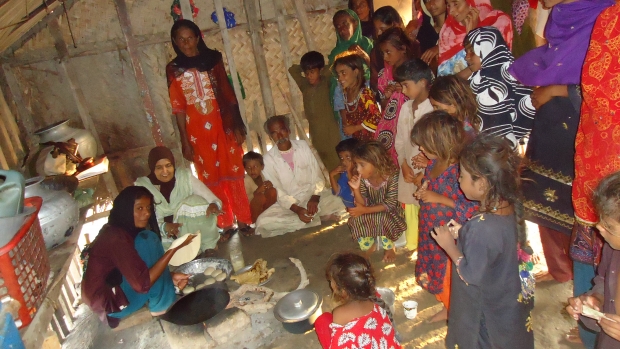Grants :: Small Grant Facilities :: Conservation and Women Empowerment
Conservation and Women Empowerment

Conservation and Women Empowerment
Objectives
To prevent the degradation of mangrove forests in the area by introducing biogas as an alternative source of fuel and enhanced local awareness and capacity on alternate energy options
Background
Mirpur Sakro is located on the Sindh coast in Thatta District. Though the locals were predominantly engaged in agricultural activities and livestock rearing, the agricultural land is now rendered useless as a result of water-logging and salinity. Those who have remained earn their livelihood cutting mangroves, and the forests are also used as grazing grounds for camels. It is estimated that women in the area spend two to five hours a day collecting fuel wood and fodder for their livestock from the mangrove forests.
The idea behind introducing biogas is that it is a much cleaner source of fuel than wood burning, leading to less air pollution and respiratory problems in the locality. Women have more time on their hands as they do not have to collect fuel wood anymore. The by-product from biogas generation can also be utilised as organic manure, which is a much better alternative to using chemical fertilizers.
Target beneficiaries
Four households where the biogas plants are constructed will benefit directly, and others in the community can benefit indirectly by following suit.
Outputs
- Establishment of four biogas plants in the project area.
- 5,500 mangrove saplings to be planted by the community in order to conserve and protect mangrove forests.
Accomplishments and challenges
- Two biogas plants constructed in the two coastal villages to demonstrate a cleaner source of alternate energy than using mangrove wood.
- Biogas plants have contributed to reduction in burden of beneficiary women who had to travel long distances to collect firewood. Instead, they have been enabled to use the saved time for other productive activities, such as embroidery, which can supplement their household income.
- Awareness of local community has been enhanced about alternate energy options.
- 100 mosquito nets distributed among the poor needy households in the target villages.
- The remoteness of the area and availability of trained manpower locally for construction of the biogas plants were the main challenges.
Contributions to cross-cutting themes
Communication
No particular emphasis on publication of project activities.
Gender Equality
The project will contribute to improving quality of lives of women in the village and reduce their dependency on mangroves for fuel wood needs.
Climate Change
Reducing dependence on mangroves and planting new saplings will ensure that the coast line is protected against natural hazards such as tsunamis and cyclones.
Lessons Learned
- Women actively participated in the project and were happy with the project support as they were involved in wood collection and suffered from smoke during cooking which had impacts on their health.
-
During project implementation, it was observed that the poor families were facing great difficulties due mosquitoes. Keeping in view this necessity 100 mosquitoes net were distributed among the poor households.
-
The remoteness of the area and availability of trained manpower for construction of the bio-gas plants, and low capacity of CBO hampered timely project implementation.
Project Facts
Country
Location
Mirpur Sakro, Thatta
Topic
Duration
5th Jul 2013 to 5th Jul 2014
MFF Grant Amount
PKR 964,340
Implementing Partner
Women Development Association (WDA)
Ms. Naheed Abro
Email: wdabadin@hotmail.com